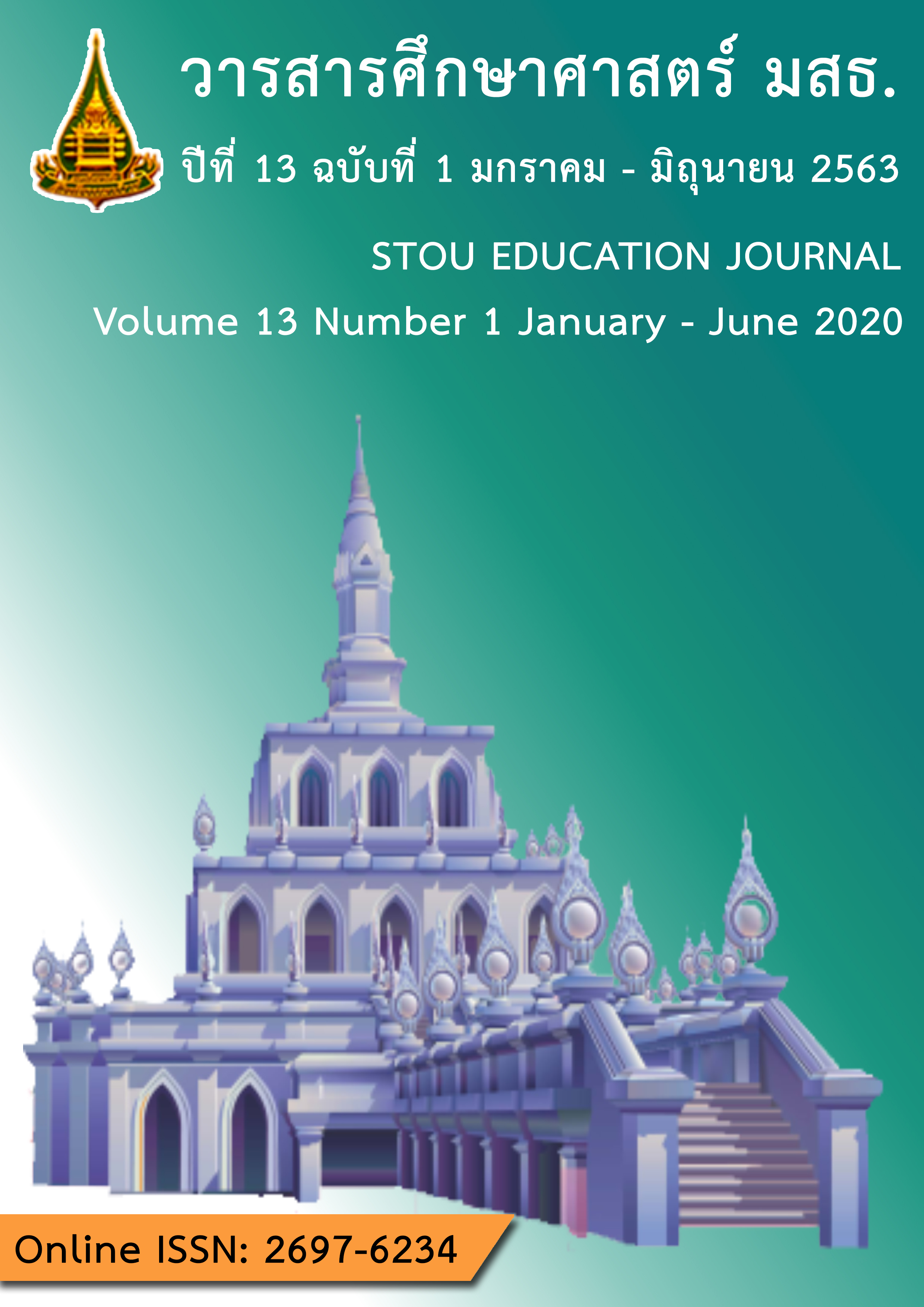การประยุกต์ใช้การประเมินที่ขับเคลื่อนด้วยทฤษฎีในการพัฒนาและประเมินโครงการพัฒนาบุคลิกภาพประชาธิปไตยของนักเรียนในโรงเรียนสังกัดสำนักงานคณะกรรมการการศึกษาขั้นพื้นฐาน
Main Article Content
บทคัดย่อ
การวิจัยมีวัตถุประสงค์เพื่อ สร้างทฤษฎีโปรแกรมในการพัฒนาวิธีการประเมินและประเมินผลโครงการพัฒนาบุคลิกภาพประชาธิปไตยของนักเรียนในโรงเรียนสังกัดสำนักงานคณะกรรมการการศึกษาขั้นพื้นฐาน กลุ่มตัวอย่างเป็นนักเรียนชั้นประถมศึกษาปีที่ 4 โรงเรียนสันทรายหลวง อำเภอสันทราย จังหวัดเชียงใหม่ จำนวน 38 คน การวิจัยแบ่งออกเป็น 3 ระยะ คือ ระยะที่ 1 สร้างทฤษฎีโปรแกรม ระยะที่ 2 พัฒนาวิธีการประเมิน ระยะที่ 3 ประเมินผลโครงการ โดยผู้มีส่วนได้ส่วนเสียเป็นผู้ให้ข้อมูล จำนวน 41 คน เครื่องมือวิจัย ได้แก่ 1) แบบทดสอบ 2) แบบประเมินความพึงพอใจในการจัดกิจกรรม 3) แบบประเมินตนเองของนักเรียน 4) แบบประเมินบุคลิกภาพประชาธิปไตยนักเรียนของครูประจำชั้น 5) แบบสอบถามความตระหนัก/จิตสำนึกของนักเรียนที่ทำให้นักเรียนมีบุคลิกภาพประชาธิปไตย และ 6) แบบประเมินโครงการ วิเคราะห์ข้อมูลโดยการหาค่าเฉลี่ย ส่วนเบี่ยงเบนมาตรฐาน และการวิเคราะห์เนื้อหา ผลการวิจัย พบว่า 1) ทฤษฎีโปรแกรม ประกอบด้วย โมเดลการกระทำ ได้กิจกรรมพัฒนาบุคลิกภาพประชาธิปไตยเป็นตัวแทรกแซง และโมเดลการเปลี่ยนแปลง ประกอบด้วย ตัวแทรกแซง ที่ได้จากโมเดลการกระทำ ซึ่งมีความตระหนัก/จิตสำนึก เป็นตัวกำหนดเชื่อมโยงระหว่างตัวแทรกแซงกับผลลัพธ์ 2) ผลการประเมินการเรียนรู้ของนักเรียนได้คะแนนเฉลี่ยโดยรวมอยู่ในเกณฑ์ดี และมีความพึงพอใจต่อการจัดกิจกรรมในภาพรวมอยู่ในระดับมากที่สุด และ 3) ผลประเมินโครงการ พบว่า นักเรียนมีบุคลิกภาพประชาธิปไตยในภาพรวมอยู่ในระดับดี และมีความตระหนัก/จิตสำนึกที่ทำให้นักเรียนมีบุคลิกภาพประชาธิปไตยในภาพรวมอยู่ในระดับมาก ผู้มีส่วนได้ส่วนเสียส่วนใหญ่เห็นด้วยกับการจัดโครงการนี้ เพราะนักเรียนสามารถนำความรู้ไปใช้ในชีวิตประจำวันได้ และนักเรียนมีบุคลิกภาพประชาธิปไตยในภาพรวมอยู่ในระดับมาก
Article Details
เอกสารอ้างอิง
กระทรวงศึกษาธิการ. (2551). หลักสูตรแกนกลางการศึกษาขั้นพื้นฐาน พุทธศักราช 2551. กรุงเทพมหานคร:
โรงพิมพ์คุรุสภาลาดพร้าว.
________. (2553). การกำหนดเกณฑ์มาตรฐานการศึกษาของสถานศึกษาตามกฎกระทรวงว่าด้วยระบบหลักเกณฑ์และวิธีการประกันคุณภาพการศึกษา พ.ศ. 2553. กรุงเทพมหานคร: สำนักทดสอบทางการศึกษา.
นพวรรณ ศรีวงศ์พานิช. (2551). เด็กไทยวิกฤติหนักครูสาธิตฯ จี้โรงเรียนสร้างวินัยนักเรียน. สืบค้นจาก http://www.twp.co.th/news/index.asp?nid=1434
ปริญญา เทวานฤมิตรกุล. (2552). การศึกษาเพื่อสร้างพลเมือง (Civic Education): พัฒนาการเมืองไทยโดยสร้างประชาธิปไตยที่ “คน”. กรุงเทพมหานคร: มูลนิธิ ฟรีดริช เนามัน.
พนม เกตุมาน. (2554). คู่มือครู: ปัญหาพฤติกรรมที่พบบ่อยในนักเรียนและแนวทางการแก้ไข. กรุงเทพมหานคร:มหาวิทยาลัยมหิดล.
ไพศาล วรคำ. (ม.ป.ป.). การประเมินเน้นทฤษฎี: มิติของศาสตร์แห่งการประเมิน. มหาสารคาม: มหาวิทยาลัยราชภัฏมหาสารคาม.
ศิริชัย กาญจนวาสี. (2560). การประเมินตามความเป็นจริง (Realist Evaluation) กับการประเมินแบบขับเคลื่อนด้วยทฤษฎี (Theory-Driven Evaluation). สารสมาคมวิจัยสังคมศาสตร์แห่งประเทศไทย, 3(1), 3-4.
สุธาทิพย์ ศิริจันทร์เพ็ญ. (2551). หนูน้อยหย่อนวินัย เรื่องใหญ่ที่ต้องแก้. สืบค้นจาก http://www.pedsocthai.org
สุริยเดว ทรีปาตี. (2554). ต้นทุนชีวิตเด็กและเยาวชนไทย (พิมพ์ครั้งที่ 7). กรุงเทพมหานคร: โรงพิมพ์เดือนตุลา.
สมคิด พรมจุ้ย. (2550). เทคนิคการประเมินโครงการ (พิมพ์ครั้งที่ 5). นนทบุรี: จตุพร ดีไซน์.
________. (2554). หน่วยที่ 11 หลักการและแนวปฏิบัติในการประเมินนโยบาย แผนงาน โครงการ และหลักสูตร ใน ประมวลสาระชุดวิชาการประเมินและการจัดการโครงการประเมิน หน่วยที่ 11-15 (พิมพ์ครั้งที่ 6, น. 1-58). นนทบุรี: สาขาวิชาศึกษาศาสตร์ มหาวิทยาลัยสุโขทัยธรรมาธิราช.
________. (2555). หน่วยที่ 13 การประเมินการดำเนินงานตามนโยบาย แผนงานและโครงการ ใน ประมวลสาระชุดวิชาการประเมินนโยบาย แผนงานและโครงการ หน่วยที่ 11-15 (น. 1-50). นนทบุรี: สาขาวิชาศึกษาศาสตร์ มหาวิทยาลัยสุโขทัยธรรมาธิราช.
สมหวัง พิธิยานุวัฒน์. (2550). ทฤษฎีการประเมิน (พิมพ์ครั้งที่ 6). กรุงเทพมหานคร: สำนักพิมพ์แห่งจุฬาลงกรณ์มหาวิทยาลัย.
________. (2551). วิธีวิทยาการประเมิน: ศาสตร์แห่งคุณค่า (พิมพ์ครั้งที่ 4). กรุงเทพมหานคร: สำนักพิมพ์แห่งจุฬาลงกรณ์มหาวิทยาลัย.
สุพักตร์ พิบูลย์ และกานดา นาคะเวช. (2554). หน่วยที่ 8 การประเมินความก้าวหน้าในการดำเนินโครงการ ในประมวลสาระชุดวิชาการประเมินและการจัดการโครงการ หน่วยที่ 6-10 (พิมพ์ครั้งที่ 6 น. 113-152). นนทบุรี: มหาวิทยาลัยสุโขทัยธรรมาธิราช.
________. (2555). หน่วยที่ 11 การประเมินความต้องการจำเป็นเพื่อกำหนดนโยบาย แผนงานและโครงการ ใน ประมวลสาระชุดวิชาการประเมินนโยบายแผนงานและโครงการ หน่วยที่ 11-15 (น. 1-43). นนทบุรี: สาขาวิชาศึกษาศาสตร์ มหาวิทยาลัยสุโขทัยธรรมาธิราช.
สำนักงานคณะกรรมการการเลือกตั้งและสำนักงานคณะกรรมการการศึกษาขั้นพื้นฐาน. (2552ก). คู่มือการจัดกิจกรรมการเรียนรู้ประชาธิปไตย สำหรับครูผู้สอน ชั้นประถมศึกษาปีที่ 1-3. กรุงเทพมหานคร: สหายบล็อกและการพิมพ์.
________. (2552ข). คู่มือการจัดกิจกรรมการเรียนรู้ประชาธิปไตย สำหรับครูผู้สอนชั้นประถมศึกษาปีที่ 4-6.
กรุงเทพมหานคร: สหายบล็อกและการพิมพ์.
สำนักงานคณะกรรมการการศึกษาขั้นพื้นฐาน. (2551). หลักสูตรแกนกลางการศึกษาขั้นพื้นฐานพุทธศักราช
กรุงเทพมหานคร: โรงพิมพ์ชุมนุมสหกรณ์การเกษตรแห่งประเทศไทยจำกัด.
อนุรักษ์ ปัญญานุวัฒน์. (ม.ป.ป.). เอกสารประกอบการสอนระดับบัณฑิตศึกษาเรื่อง แนวคิดการประเมินโครงการ.
เชียงใหม่: มหาวิทยาลัยเชียงใหม่.
BickMan, L. (1987). Using program theory in evaluation: New directions for program evaluation. San Francisco: Jossey-Bass.
Chen, H.T. (1983). Evaluation with sense: The theory-driven approach. Evaluation Review, 7(3), 283-302.
_______. (1990). Theory-driven evaluation. California, CA: Sage Publications.
_______. (2005). Practical program evaluation. California, CA: Sage Publications.
Guba, E.G. & Lincoln, Y.S. (1989). Fourth generation evaluation. Newbury Park: Sage Publications.
Patton, M.Q. (1975). Alternative evaluation research paradigm. N.D.: North Dakota Study Group on Revaluation.
_______. (1980). Qualitative evaluation method. California, CA: Sage Publications.
Piaget, J. (1965). The moral judgment of the child. New York, NY: Free Press.
Thorndike, E.L. (1975). Connectionism theory. University of London.


